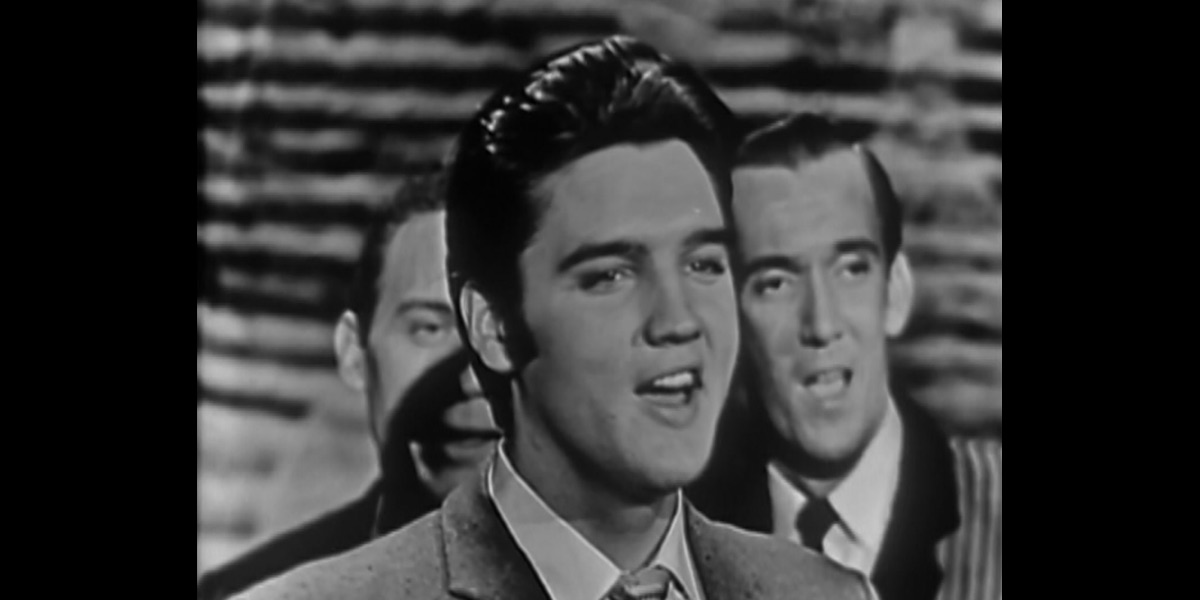“Trouble” from Elvis Presley’s ’68 Comeback Special is a powerful performance that captures the essence of his raw talent and stage presence. This particular rendition, also known as “Trouble (Discotheque),” showcases Elvis at a pivotal moment in his career, reaffirming his status as the King of Rock ‘n’ Roll.

The ’68 Comeback Special, officially titled “Singer Presents…ELVIS,” aired on NBC on December 3, 1968. It marked Elvis’s return to live performance after several years focused on his film career. This special was crucial for Elvis, as it was designed to reestablish him as a dominant force in the music industry. Among the various memorable performances in the special, “Trouble” stands out for its intensity and raw energy.
Originally written by Jerry Leiber and Mike Stoller, “Trouble” was first recorded by Elvis for the 1958 film “King Creole.” The song’s lyrics and melody are infused with a sense of defiance and rebellion, perfectly suited to Elvis’s persona. In the ’68 Comeback Special, “Trouble” takes on a new life, benefiting from the live setting and Elvis’s electrifying performance.

The performance begins with Elvis dressed in black leather, exuding a rugged charm that is both captivating and intimidating. As the music starts, the camera focuses on Elvis’s commanding presence, highlighting his every move and expression. The atmosphere is charged with excitement, and the audience’s anticipation is palpable.
Elvis’s voice in “Trouble” is powerful and full of attitude, reflecting the song’s themes of defiance and confrontation. His delivery is impeccable, capturing the song’s rebellious spirit. The arrangement, with its driving beat and sharp instrumentation, complements Elvis’s vocal intensity, creating a performance that is both dynamic and unforgettable.

The choreography and stage setup for “Trouble” are minimalist yet effective, allowing Elvis’s performance to take center stage. The close-up shots and dramatic lighting enhance the overall impact, emphasizing the raw emotion and energy that Elvis brings to the song. This performance is a testament to Elvis’s ability to connect with his audience and convey a wide range of emotions through his music.
The ’68 Comeback Special, and particularly the performance of “Trouble,” played a significant role in revitalizing Elvis’s career. It reminded audiences of his unparalleled talent and charisma, solidifying his place in the annals of music history. The special was a turning point, leading to a renewed focus on live performances and studio recordings, and ultimately, a resurgence in Elvis’s popularity.

In conclusion, “Trouble (Discotheque)” from the ’68 Comeback Special is a defining moment in Elvis Presley’s career. It showcases his exceptional talent, stage presence, and ability to captivate an audience. This performance remains a highlight in Elvis’s illustrious career, symbolizing his enduring legacy as the King of Rock ‘n’ Roll.
Elvis Aaron Presley, often referred to as the “King of Rock and Roll,” was born on January 8, 1935, in Tupelo, Mississippi, USA. He rose to prominence in the mid-1950s, becoming one of the most iconic and influential figures in the history of popular music. Presley’s musical journey began at an early age when he started singing in church and listening to various genres of music, including gospel, blues, and country. In 1954, he signed a recording contract with Sun Records, where he began his career blending elements of rockabilly, rhythm and blues, and country music. His breakthrough came with the release of his first single, “That’s All Right,” followed by a string of hits such as “Heartbreak Hotel,” “Hound Dog,” and “Jailhouse Rock.” With his charismatic stage presence, distinctive voice, and provocative dance moves, Presley captured the hearts of audiences worldwide, revolutionizing the music industry and popular culture. Presley’s impact extended beyond music; he also found success as an actor, starring in a series of films throughout the 1960s. Despite his commercial success, he faced criticism from some quarters for his crossover into mainstream entertainment and the perceived dilution of his musical authenticity. Throughout his career, Presley struggled with the pressures of fame, leading to personal challenges, including substance abuse and health issues. Despite these obstacles, he remained a beloved figure, revered for his contributions to music and his enduring legacy. Tragically, Elvis Presley passed away on August 16, 1977, at the age of 42, leaving behind a legacy that continues to resonate with generations of fans. He was posthumously inducted into the Rock and Roll Hall of Fame, and his music remains a timeless testament to his enduring talent and cultural impact.

